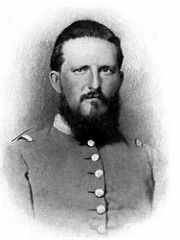August 3, 1862.
For some days I have been expecting that every mail would bring me a letter from home, but have been disappointed. I am sure a letter is on the way, and that you would not suffer two weeks to pass without writing to me. I wrote to you some ten days ago, just after I got here. It may be this did not reach you, and you do not know where I am. I am getting to feel used to the army and to the idea of staying in it until I see the end of the war, or it sees the end of me. The work entrusted to me is highly honorable and very agreeable. I think it will be sufficient to keep me employed and make me as happy as I have ever been in the service. The only objection to it is that my labor is gratuitous and I draw no pay. I shall try and make my expense account as small as possible. The army is more quiet than I have ever known it. The enemy have considerable force some thirty or forty miles from us, amounting possibly to 30,000 men. Their cavalry and ours are occasionally skirmishing, and yesterday had quite a severe engagement with one of our regiments at Orange C. H. They are said to have had some three regiments against our one, and, so far as I can learn, we got the worst of it. No very serious damage, however, as our killed and wounded are only fifteen.
To-day–Sunday–is very quiet, and reminds me much of a Sunday at home, the usual work being suspended. Formerly everything went on as usual on any day, but now the drills and ordinary work of the week are suspended on Sunday. Whilst employment here will make me contented, for there is no use in grieving about what must be borne, yet I heartily wish that I was at home with you and our dear little children. Affection and sympathy attract me towards home as the dearest place on earth, but duty to my country and respect for my own manhood require that I should forego this happiness until the war ends–as end it must, sooner or later. I trust, darling, that you will be as contented and happy as you can under the circumstances. The inconveniences to which you are subjected are just the same which all other ladies have to bear. You, at least, have all the comforts of home and necessaries of life, whilst the wife and little ones of many a gallant man in the service are exiles from their homes or without the necessaries of life. It is a poor consolation for your own troubles that others have worse; but it is alike the dictate of piety and virtue to bear them in patience, and thus show that you merit a better fate. The war must end some day. “We may never live to see it. But we owe to ourselves to cherish the hope that we may one day live happily together again, and there will be bright sunshine after the storm which now envelops us.
